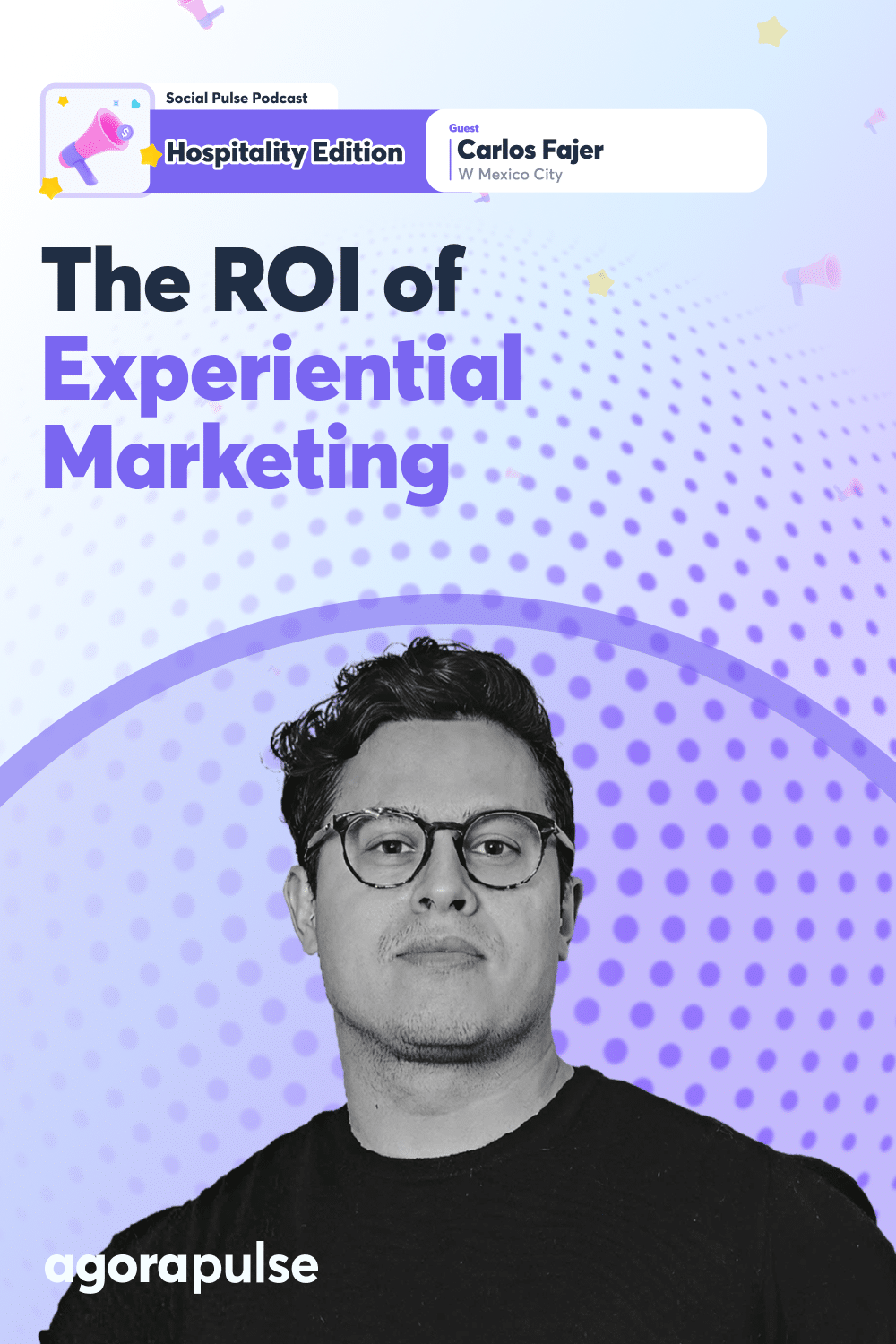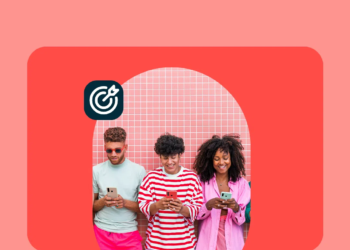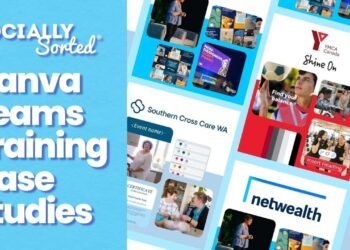Other hotels are investing heavily in experiential marketing, yet you struggle to justify the expenses to leadership. Should you be measuring guest satisfaction differently?
What about long-term brand value, and how do you connect these experiences to actual revenue? These are questions that keep many hospitality marketers up at night, and that’s exactly what we’re going to address today.
In this recap of Social Pulse: Hospitality Edition, powered by Agorapulse, guest Carlos Fajer, Marketing and Communications Director at W Mexico City, has mastered the art of not just creating exceptional brand experiences but measuring their true business impact. He’s here to share his practical approach to proving ROI and identifying the metrics that matter.
[Listen to the full episode below, or read along for the transcript of the Social Pulse: Hospitality Edition, powered by Agorapulse. Try it for free today.]
What initially inspired your focus on creating these kinds of premium brand experiences?
Carlos Fajer: I have to speak a little bit about myself and my past. I studied a bachelor’s degree in literature, dramatic literature, and theater.
So I think that gives me a perspective, but also I have always had in mind creating characters and stages and imagining storytelling as the base of everything I do.
So I think that’s the way I ended up in marketing because I feel like I’m always a storyteller, and I think that for successful experiences for our customers, guests, for myself, there has to be this narrative ingredient when something interests me.
It’s always a performance, even when you are just on the front line, not in the marketing department. You are giving this smile, and you are interacting with your guests with that unique story where you are welcoming them, and your thoughts or your personal experience are just behind the stage, and you are there smiling and telling them welcome.
What do you think some of the common misconceptions are about measuring the success of these kinds of brand experiences in hospitality?
Carlos Fajer: I think that we have to educate our colleagues a little bit and make them know that to get money, we have to invest money. And that’s a difficult conversation.
So what I try to do is go and explain a little bit about this famous marketing funnel, when you have awareness first and then interest, and at the end of the funnel, you have something like this return or this purchase or this money value that you want to get. So I need to spend time with them and explain that we have to work first on this awareness, and that’s a lot of work that we have to do to get to that. But that we will get to the part when we can have the money, and that we cannot just invest in the last part of the funnel and think that we’ll get immediate results.
So, the first point, I will say that we have to educate our colleagues a little bit and make sure that everyone else understands it. And that’s the reason why do things, because it’s not only for experiential marketing, if you go to a Starbucks and you get a coupon where you say that you are getting a free frappuccino and the cashier does not know about the promotion and has knowing and is not involved in what the brand is working on, all that work that the marketing team and all the directors work won’t have results just because one person was not involved in all the communication chain.
So I think that you have to also involve everyone in the operations team and other directors, even, I don’t know, engineering, or the stewards. Everyone has to know because you never know when an approach from a customer will come.
Could you share what your role is exactly?
Carlos Fajer: Absolutely. The W brand is very famous for always having good programming and entertainment. So if you’re choosing between a couple of hotels in the same block, you know that at the W, something is happening, and then they for sure have a special DJ or art exhibit, or probably a good gastronomic festival.
So we always have something happening. So I’m in charge of creating those, programming, and whatever experience we are up to, from a culinary experience to a fantastic imaginary world, along with a famous studio like Universal, some of the things that we have done that are successful.
So I’m here to create unique experiences for all of our guests.
How are you quantifying the impact of these events?
Carlos Fajer: Sure. First, there’s all this backstage work where we have to prepare the right story, the storytelling from the media pitch that we are going to share for all this imaginary world that we as the staff of the W have to perform, let’s say, and bring that experience.
With that pitch, we go to the right media and influencers. We do invest in bringing the right people to communicate our story, and that is when we have to work very closely with all the operations.
So because of the customers we’ll start coming, the first one week or two are crucial because they have to have a very nice, curated amazing experience because the word of mouth is the best alley you can have for us, there’s no like magic trick you if you make people happy and entertain, they will bring more people to, your property. So once you have that consistency with everyone, people will start flowing.
And then is when you just have to be prepared with your numbers with all the purchases that you have to make or all the right amount of food and beverage and having the right entertainment on the DJ, of course, those prices have to make sense, so at the end you can have, a good return of investment. So yeah, there’s no formula, but consistency on the job. I think it’s crucial to bring people because those people, at the end, are the satisfied customers at the end, will bring the money that we all work for.
Is there a way that you’re identifying which metrics are most relevant for any given particular brand experience or event?
Carlos Fajer: For me, there are two kinds of measurements. The first at the beginning of each experience or entertainment, of course, we have to measure a media return on investment, making sure that we have the right media and the right people to amplify our news, our content. Get to a point where you are really, that people are really speaking about your new entertainment.
So I would love to say the exact number, but for me, it’s more like the vibe when I start getting messages from friends. Hey, I saw that you’re having that DJ at your hotel. Hey, I saw that you are having, or you’re hosting, the EDC kickoff party. So when I get the buzz, I know that we are performing well on the PR and media side.
I’m always listening to that boss, of course, checking that my Reel with information is becoming either viral or that I start getting many answers, many replies to the social media account.
So once I know that buzz is happening, I know that the return on media investment is being successful, despite the number.
And then the thing that, of course, the finance department loves to hear is that we are performing well and that we are having a good ratio of people consuming our product, whatever that’s it.
And it is not like we got the number and that’s perfect. On the way, you have to make sure that you are approaching that number where you are having, you are getting the return. So, I have always been working to get what everyone wants to have it like almost immediately. But it’s also again like feeling the concept that you are getting to that number and there’s a moment where you have to be really, fair with yourself and ask in the case that it’s not approaching to that number, maybe there’s something wrong in the formula and get to the moment of speaking with all the other colleagues.
Maybe this is too expensive or maybe we are targeting the wrong audience because we’re seeing that this is behaving differently and be wise enough to change the direction in the case that you’re not getting to your right number and if you are approaching there, it is just keeping consistency and going there, getting that moment when you are making happy the finance people.
So, as my boss says, success is never final. You have to keep working to get there.
Could you share an example of an event that you ran where you got there, where you saw some success, you impressed those stakeholders, and you were measuring the ROI for them?
Carlos Fajer: Of course, I will tell you two examples we can, so I can share some of the knowledge with your listeners.
So first we have this partnership with Warner Pictures, with Barbie, the movie. So we made this experience, it was a diner themed as the movie it was called, it’s a Barbie World, and everything was pink. And we have a lot of props where we can either do a reel or a nice pose with milk, with enormous milk … And a lot of photo opportunities. We choose the right partners, a platform that allows us to track every minute the ticket sales. We also partner with a nice design agency that prepares everything to look beautiful and pink and colorful, and gets like a movie set.
Again, making a story, a narrative where people felt like a character in that movie. And of course, our chef prepared a delicious menu. Sometimes people forget about that. Details like the food. You go to a music festival and you try the worst hot dog of your life. So here we don’t have any details as given.
We make sure that if those are just a hamburger is the best hamburger you are having, or if you are having something like pink spaghetti, make sure that it also tastes delicious and that it is good for you. So, having those components, we sold out in 72 hours. We even have to ask our partner Warner to have permission to add more times to our experience.
And we have a let’s say an instant success because of all the movie momentum that we were living. I know that everyone knows what I’m talking about because. Everyone was talking about Barbie, and we saw pink waves happening. After that, we were given another title. It was Wonka, the movie.
Maybe it didn’t have the hype of Barbie because Barbie was transgenerational; everyone had a Barbie for that moment. And maybe Wonka wasn’t that big of a universe. But we know the previous knowledge of Barbie. So again, we chose the right partners, the right agency to sell the tickets, the media, the content, the food we even asked for to see the movie in advance, and they granted us so we could prepare.
A universe that speaks to the people coming. So at the beginning, we didn’t see that many people coming. And the change, the shift that we try to start treating everyone as a child, because we have a lot of desserts, a lot of chocolate-based items. But we have these wings in the movie. Like on our menu, we have chocolate or coffee with milk. And we put it there, it comes with giraffe milk because in the movie you can see that the characters drink giraffe milk for the chocolate. So in the beginning, people were probably just reading it and feeling like it was fun, but then, we try to make that a part of the waiter’s character and tell, hey, our chef just came from milking the giraffe, and start feeling what they see and read. It’s part of a revolution. So I think that the shifting point was when we spoke to our weather and the line.
They had to see the movie, and they had to treat everyone as children because we saw, we noticed that they were good at telling the story to the kids coming because it’s natural for us to guide the kids through experience. So when we start doing that, also with the adults. We prove that everyone comes for the experience of feeling immersed in that world and that everyone wants to feel part of it.
A little bit like you were saying, like in Disney, where everyone is a character, and you want everyone to feel the magic.
Mike Allton: Love that. It reminds me of Andy’s Barbecue Restaurant at Disney, where you are supposed to be a toy. In Andy’s world from Toy Story, when you go in and all of the diners and all the wait staff, they’re all participating in this illusion that Andy’s there. And if Andy comes, everybody in the restaurant has to stop and be quiet, just like you would freeze as a toy.
I love these examples, Carlos, because you’re sharing not just the practical tips of working with great vendors and that sort of thing, but you’re sharing this nuanced idea of newsjacking, trending pop culture.
What strategies do you use to ensure that there’s alignment between the kinds of brand experiences that you want to do and actual business objectives?
Carlos Fajer: I don’t want to sound silly, but don’t take no for an answer. So you have to keep pushing because all the marketing leaders probably will understand this. Often, the word ideas is crazy for other colleagues.
You have to have the data or something that backs it, that you can prove that it will be a success story, and keep pushing because the reaction, I think that will be a no.
I got plenty of those, but I have to keep showing that’s the right path. Of course, at some moment, you have the trust and the confidence to do that, but there’s always questioning. So I’m always prepared to answer those questions, and they know that I will keep pushing, and yeah, there’s always someone new in the team.
So you very often think that you have to be prepared to receive it now, and convince them that we are prepared to show something amazing to our customers and guests.
What role does that play in evaluating the impact of the overall brand experience?
Carlos Fajer: Everything. The audience is our client. It is they, those are the people who are paying for the experience, so they are the boss at the end of the story.
So you have to listen to them well and know what is trending, what people want, and create that for them. And also speaking about the service industry, we’re always listening to our guests, how was their stay at the checkout, or to our restaurant customers, how was their meal? So you get set feedback all the time.
I know that sometimes it’s not pleasant to listen to all the feedback that someone can give, but you have to keep in mind that our customers are the main reason we are here. And that’s our strength as well, because I believe that people trust us so much for their events or for having a business meeting at hotels. After all, they know that we take very serious responsibility for the service and the experience.
But if you want to succeed in the hospitality industry, you have to be prepared to listen and take immediate action.
Another way to succeed: Learn wisdom and insights from hospitality experts in every episode of Social Pulse: Hospitality Edition.
Carlos Fajer: Yes. I have an agency that is always doing that social listening.
I read that, but also when something is, especially when something’s wrong, when someone is not satisfied, that will come up immediately, oh, the negative comments always come first. So again, it’s like having a live conversation. So if you are reading a message that is telling you that something is not right with the quality, with enough quality, or something that is a potential crisis.
You have to respond immediately. And yeah, my agency or my peers know that when something like that comes, we have to be all involved in that right moment.
So, either if it’s a social media tool or something that is happening right now in the property, we have to act immediately and make sure that person leaves the place happy.
Are there any resources that you turn to for keeping up with trends and even pop culture trends?
Carlos Fajer: I do. It’s not a tool, it’s more like a skill that we all marketers have, probably that’s passion. I’m passionate about the W brand. I love it. I am always thinking through that lens. So when I go out and I see words, people like all going and what’s trending, I try to understand it.
It is not understand it to copy it is like understand what is exciting people so I can create something for them that has that component and I cannot tell you an exact social media account, but when I see something that I like on Instagram or Facebook or whatever that feels like there’s creativity or there’s inspiration and there’s a pop of color that attracts my eye, I make sure that I go and I understand it, and of course I will like it and follow it, but you had, you have to have a sharp eye, to understand what’s happening and keep up with the experiences or the marketing trends.
So for me, keeping my eyes open a little bit deeper with everything that attracts me.
I’ll be happy to connect with more passionate people like you. I love talking to you about this and feel someone who is also understanding this beautiful world of creating experiences and FOMO for everyone. Thank you for having me. I hope to connect with other people through you.
Thank you for reading the highlights of this episode of Social Pulse: Hospitality, powered by Agorapulse. Try Agorapulse for FREE today!
And don’t forget to find the Social Pulse Podcast: Hospitality Edition on Apple, as well as other editions like the Retail, Agency, and B2B.

















